Global Financial Crisis and Its Impact
VerifiedAdded on 2020/10/22
|7
|2656
|225
AI Summary
The assignment discusses the global financial crisis that occurred in 2008-09 and its effects on various countries. It highlights the key issues such as poverty, inflation, lack of trust in government, and slow GDP growth. The document also examines the impact of the crisis on different industries, including banking and finance, and provides references to relevant studies and research papers.
Contribute Materials
Your contribution can guide someone’s learning journey. Share your
documents today.
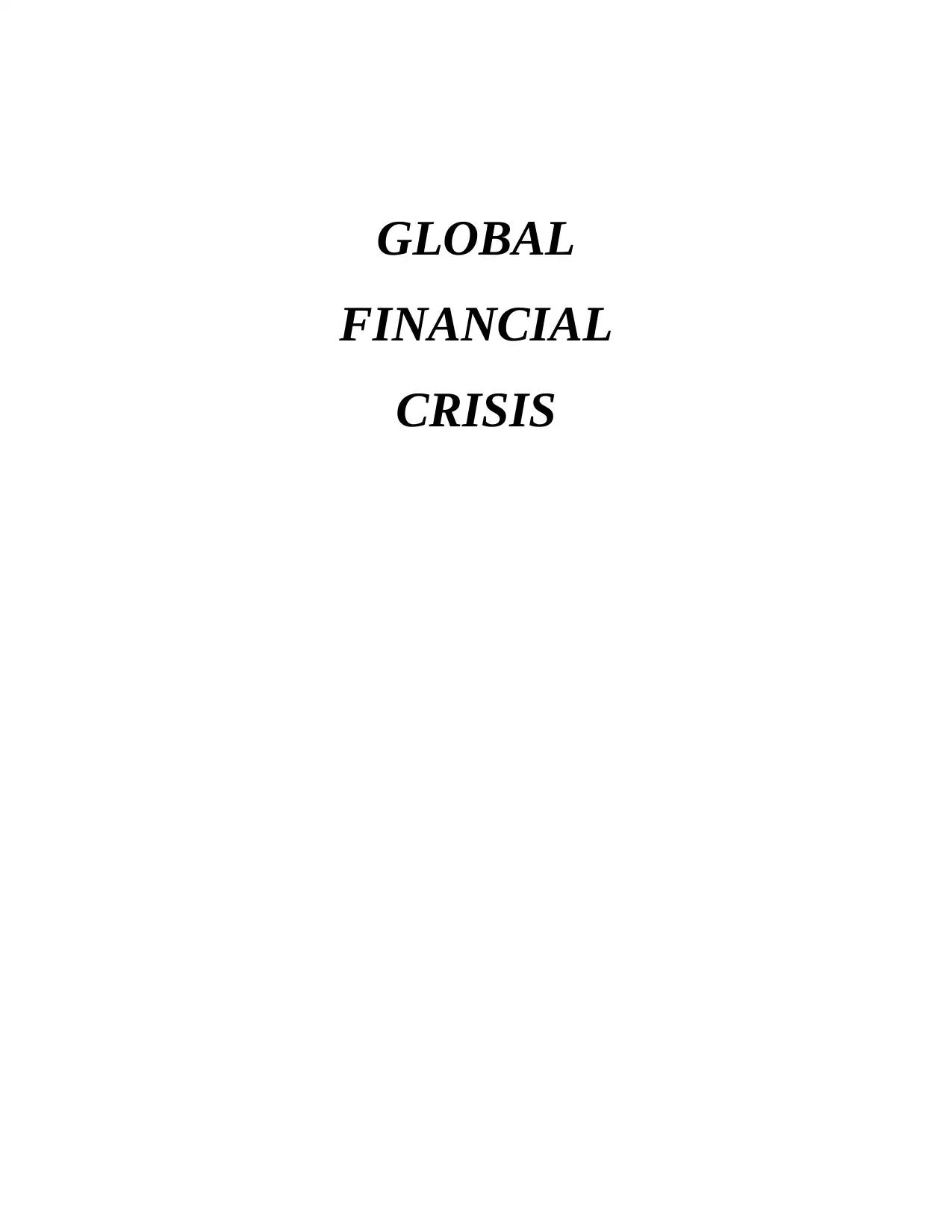
GLOBAL
FINANCIAL
CRISIS
FINANCIAL
CRISIS
Secure Best Marks with AI Grader
Need help grading? Try our AI Grader for instant feedback on your assignments.
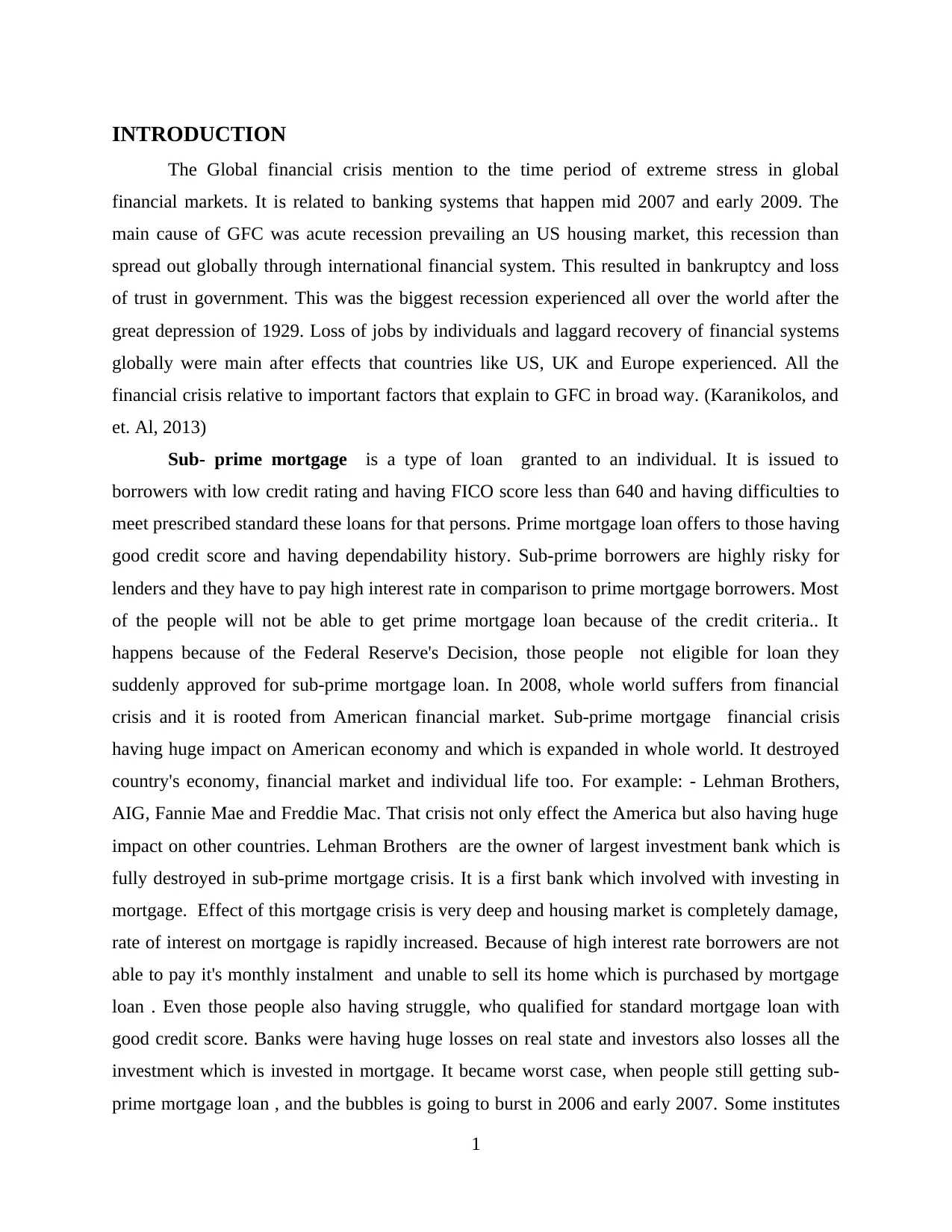
INTRODUCTION
The Global financial crisis mention to the time period of extreme stress in global
financial markets. It is related to banking systems that happen mid 2007 and early 2009. The
main cause of GFC was acute recession prevailing an US housing market, this recession than
spread out globally through international financial system. This resulted in bankruptcy and loss
of trust in government. This was the biggest recession experienced all over the world after the
great depression of 1929. Loss of jobs by individuals and laggard recovery of financial systems
globally were main after effects that countries like US, UK and Europe experienced. All the
financial crisis relative to important factors that explain to GFC in broad way. (Karanikolos, and
et. Al, 2013)
Sub- prime mortgage is a type of loan granted to an individual. It is issued to
borrowers with low credit rating and having FICO score less than 640 and having difficulties to
meet prescribed standard these loans for that persons. Prime mortgage loan offers to those having
good credit score and having dependability history. Sub-prime borrowers are highly risky for
lenders and they have to pay high interest rate in comparison to prime mortgage borrowers. Most
of the people will not be able to get prime mortgage loan because of the credit criteria.. It
happens because of the Federal Reserve's Decision, those people not eligible for loan they
suddenly approved for sub-prime mortgage loan. In 2008, whole world suffers from financial
crisis and it is rooted from American financial market. Sub-prime mortgage financial crisis
having huge impact on American economy and which is expanded in whole world. It destroyed
country's economy, financial market and individual life too. For example: - Lehman Brothers,
AIG, Fannie Mae and Freddie Mac. That crisis not only effect the America but also having huge
impact on other countries. Lehman Brothers are the owner of largest investment bank which is
fully destroyed in sub-prime mortgage crisis. It is a first bank which involved with investing in
mortgage. Effect of this mortgage crisis is very deep and housing market is completely damage,
rate of interest on mortgage is rapidly increased. Because of high interest rate borrowers are not
able to pay it's monthly instalment and unable to sell its home which is purchased by mortgage
loan . Even those people also having struggle, who qualified for standard mortgage loan with
good credit score. Banks were having huge losses on real state and investors also losses all the
investment which is invested in mortgage. It became worst case, when people still getting sub-
prime mortgage loan , and the bubbles is going to burst in 2006 and early 2007. Some institutes
1
The Global financial crisis mention to the time period of extreme stress in global
financial markets. It is related to banking systems that happen mid 2007 and early 2009. The
main cause of GFC was acute recession prevailing an US housing market, this recession than
spread out globally through international financial system. This resulted in bankruptcy and loss
of trust in government. This was the biggest recession experienced all over the world after the
great depression of 1929. Loss of jobs by individuals and laggard recovery of financial systems
globally were main after effects that countries like US, UK and Europe experienced. All the
financial crisis relative to important factors that explain to GFC in broad way. (Karanikolos, and
et. Al, 2013)
Sub- prime mortgage is a type of loan granted to an individual. It is issued to
borrowers with low credit rating and having FICO score less than 640 and having difficulties to
meet prescribed standard these loans for that persons. Prime mortgage loan offers to those having
good credit score and having dependability history. Sub-prime borrowers are highly risky for
lenders and they have to pay high interest rate in comparison to prime mortgage borrowers. Most
of the people will not be able to get prime mortgage loan because of the credit criteria.. It
happens because of the Federal Reserve's Decision, those people not eligible for loan they
suddenly approved for sub-prime mortgage loan. In 2008, whole world suffers from financial
crisis and it is rooted from American financial market. Sub-prime mortgage financial crisis
having huge impact on American economy and which is expanded in whole world. It destroyed
country's economy, financial market and individual life too. For example: - Lehman Brothers,
AIG, Fannie Mae and Freddie Mac. That crisis not only effect the America but also having huge
impact on other countries. Lehman Brothers are the owner of largest investment bank which is
fully destroyed in sub-prime mortgage crisis. It is a first bank which involved with investing in
mortgage. Effect of this mortgage crisis is very deep and housing market is completely damage,
rate of interest on mortgage is rapidly increased. Because of high interest rate borrowers are not
able to pay it's monthly instalment and unable to sell its home which is purchased by mortgage
loan . Even those people also having struggle, who qualified for standard mortgage loan with
good credit score. Banks were having huge losses on real state and investors also losses all the
investment which is invested in mortgage. It became worst case, when people still getting sub-
prime mortgage loan , and the bubbles is going to burst in 2006 and early 2007. Some institutes
1
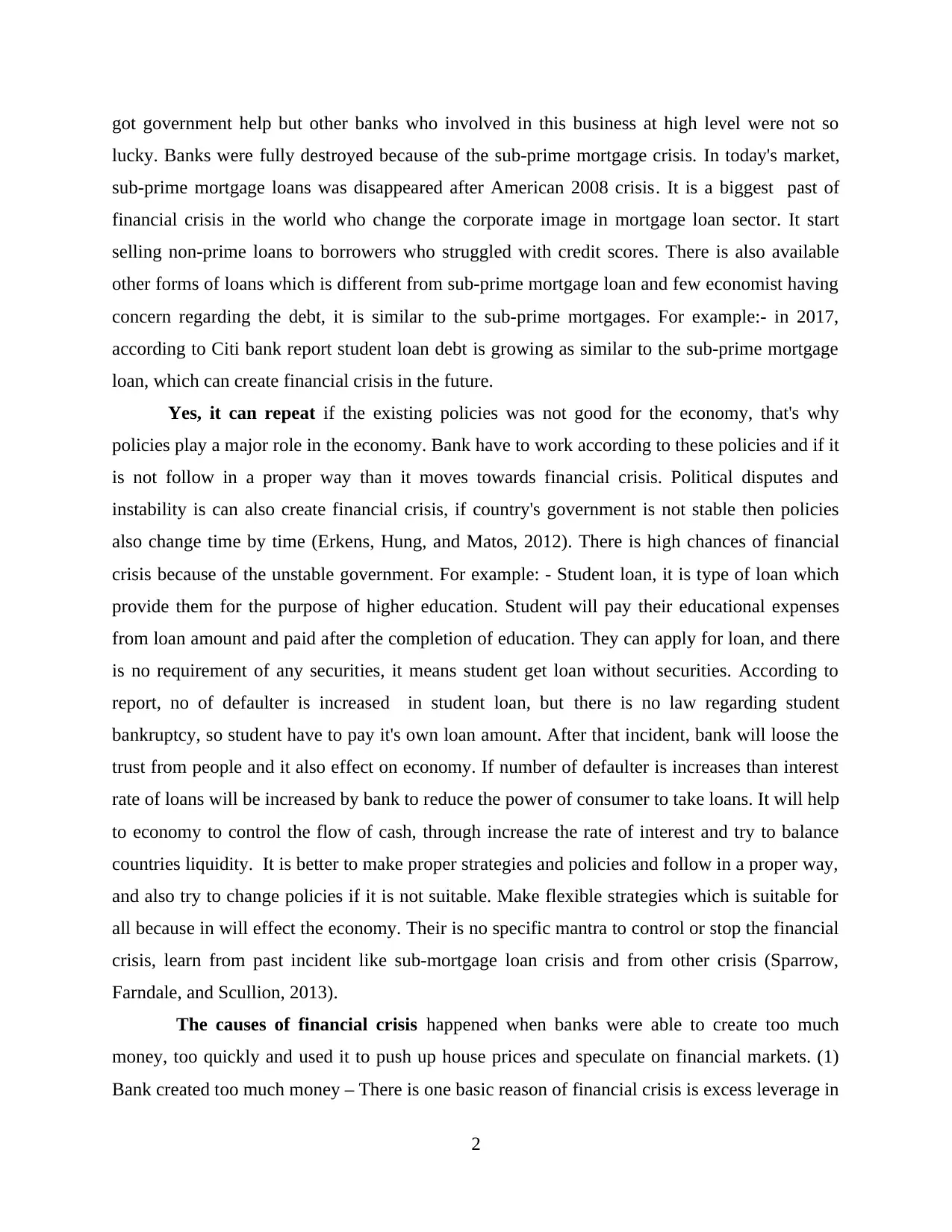
got government help but other banks who involved in this business at high level were not so
lucky. Banks were fully destroyed because of the sub-prime mortgage crisis. In today's market,
sub-prime mortgage loans was disappeared after American 2008 crisis. It is a biggest past of
financial crisis in the world who change the corporate image in mortgage loan sector. It start
selling non-prime loans to borrowers who struggled with credit scores. There is also available
other forms of loans which is different from sub-prime mortgage loan and few economist having
concern regarding the debt, it is similar to the sub-prime mortgages. For example:- in 2017,
according to Citi bank report student loan debt is growing as similar to the sub-prime mortgage
loan, which can create financial crisis in the future.
Yes, it can repeat if the existing policies was not good for the economy, that's why
policies play a major role in the economy. Bank have to work according to these policies and if it
is not follow in a proper way than it moves towards financial crisis. Political disputes and
instability is can also create financial crisis, if country's government is not stable then policies
also change time by time (Erkens, Hung, and Matos, 2012). There is high chances of financial
crisis because of the unstable government. For example: - Student loan, it is type of loan which
provide them for the purpose of higher education. Student will pay their educational expenses
from loan amount and paid after the completion of education. They can apply for loan, and there
is no requirement of any securities, it means student get loan without securities. According to
report, no of defaulter is increased in student loan, but there is no law regarding student
bankruptcy, so student have to pay it's own loan amount. After that incident, bank will loose the
trust from people and it also effect on economy. If number of defaulter is increases than interest
rate of loans will be increased by bank to reduce the power of consumer to take loans. It will help
to economy to control the flow of cash, through increase the rate of interest and try to balance
countries liquidity. It is better to make proper strategies and policies and follow in a proper way,
and also try to change policies if it is not suitable. Make flexible strategies which is suitable for
all because in will effect the economy. Their is no specific mantra to control or stop the financial
crisis, learn from past incident like sub-mortgage loan crisis and from other crisis (Sparrow,
Farndale, and Scullion, 2013).
The causes of financial crisis happened when banks were able to create too much
money, too quickly and used it to push up house prices and speculate on financial markets. (1)
Bank created too much money – There is one basic reason of financial crisis is excess leverage in
2
lucky. Banks were fully destroyed because of the sub-prime mortgage crisis. In today's market,
sub-prime mortgage loans was disappeared after American 2008 crisis. It is a biggest past of
financial crisis in the world who change the corporate image in mortgage loan sector. It start
selling non-prime loans to borrowers who struggled with credit scores. There is also available
other forms of loans which is different from sub-prime mortgage loan and few economist having
concern regarding the debt, it is similar to the sub-prime mortgages. For example:- in 2017,
according to Citi bank report student loan debt is growing as similar to the sub-prime mortgage
loan, which can create financial crisis in the future.
Yes, it can repeat if the existing policies was not good for the economy, that's why
policies play a major role in the economy. Bank have to work according to these policies and if it
is not follow in a proper way than it moves towards financial crisis. Political disputes and
instability is can also create financial crisis, if country's government is not stable then policies
also change time by time (Erkens, Hung, and Matos, 2012). There is high chances of financial
crisis because of the unstable government. For example: - Student loan, it is type of loan which
provide them for the purpose of higher education. Student will pay their educational expenses
from loan amount and paid after the completion of education. They can apply for loan, and there
is no requirement of any securities, it means student get loan without securities. According to
report, no of defaulter is increased in student loan, but there is no law regarding student
bankruptcy, so student have to pay it's own loan amount. After that incident, bank will loose the
trust from people and it also effect on economy. If number of defaulter is increases than interest
rate of loans will be increased by bank to reduce the power of consumer to take loans. It will help
to economy to control the flow of cash, through increase the rate of interest and try to balance
countries liquidity. It is better to make proper strategies and policies and follow in a proper way,
and also try to change policies if it is not suitable. Make flexible strategies which is suitable for
all because in will effect the economy. Their is no specific mantra to control or stop the financial
crisis, learn from past incident like sub-mortgage loan crisis and from other crisis (Sparrow,
Farndale, and Scullion, 2013).
The causes of financial crisis happened when banks were able to create too much
money, too quickly and used it to push up house prices and speculate on financial markets. (1)
Bank created too much money – There is one basic reason of financial crisis is excess leverage in
2
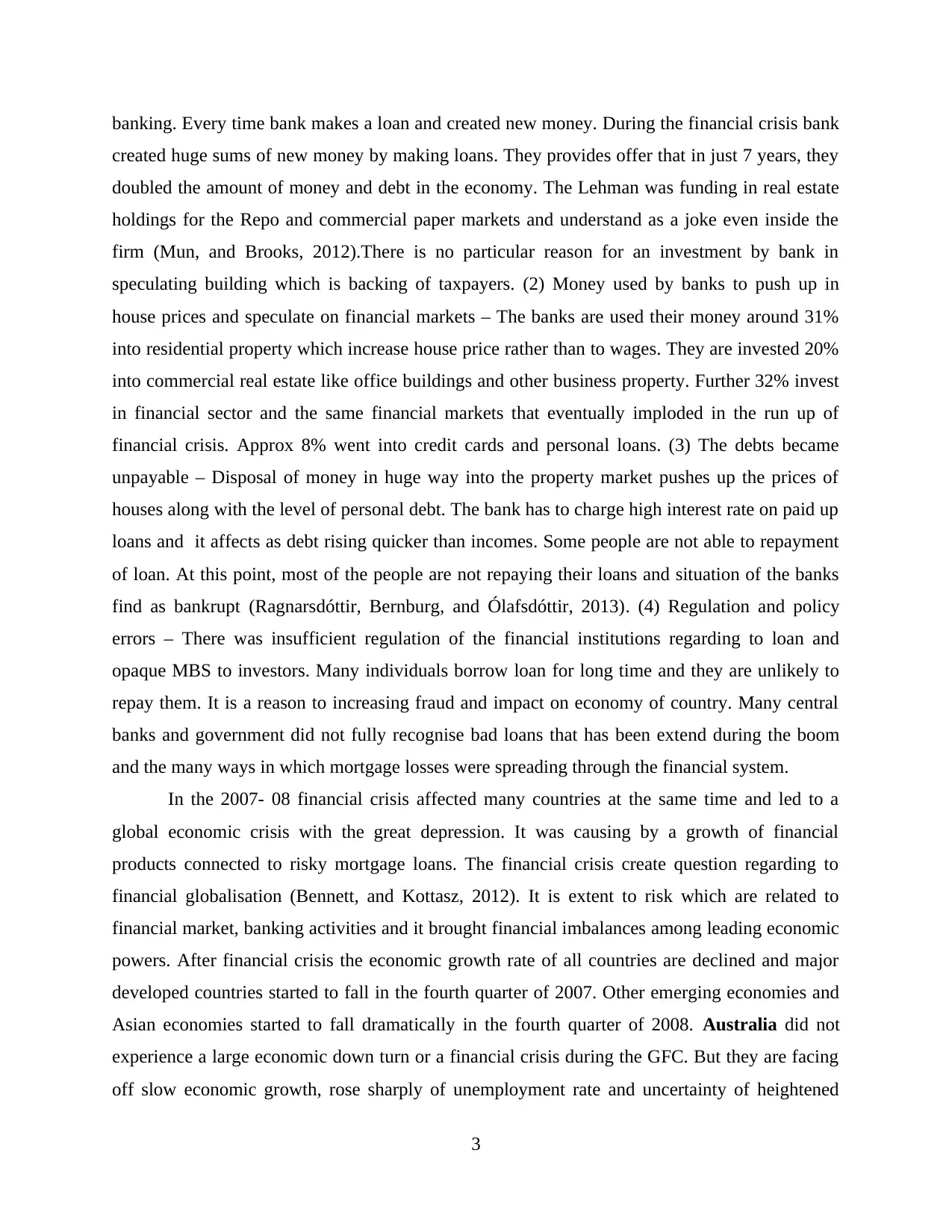
banking. Every time bank makes a loan and created new money. During the financial crisis bank
created huge sums of new money by making loans. They provides offer that in just 7 years, they
doubled the amount of money and debt in the economy. The Lehman was funding in real estate
holdings for the Repo and commercial paper markets and understand as a joke even inside the
firm (Mun, and Brooks, 2012).There is no particular reason for an investment by bank in
speculating building which is backing of taxpayers. (2) Money used by banks to push up in
house prices and speculate on financial markets – The banks are used their money around 31%
into residential property which increase house price rather than to wages. They are invested 20%
into commercial real estate like office buildings and other business property. Further 32% invest
in financial sector and the same financial markets that eventually imploded in the run up of
financial crisis. Approx 8% went into credit cards and personal loans. (3) The debts became
unpayable – Disposal of money in huge way into the property market pushes up the prices of
houses along with the level of personal debt. The bank has to charge high interest rate on paid up
loans and it affects as debt rising quicker than incomes. Some people are not able to repayment
of loan. At this point, most of the people are not repaying their loans and situation of the banks
find as bankrupt (Ragnarsdóttir, Bernburg, and Ólafsdóttir, 2013). (4) Regulation and policy
errors – There was insufficient regulation of the financial institutions regarding to loan and
opaque MBS to investors. Many individuals borrow loan for long time and they are unlikely to
repay them. It is a reason to increasing fraud and impact on economy of country. Many central
banks and government did not fully recognise bad loans that has been extend during the boom
and the many ways in which mortgage losses were spreading through the financial system.
In the 2007- 08 financial crisis affected many countries at the same time and led to a
global economic crisis with the great depression. It was causing by a growth of financial
products connected to risky mortgage loans. The financial crisis create question regarding to
financial globalisation (Bennett, and Kottasz, 2012). It is extent to risk which are related to
financial market, banking activities and it brought financial imbalances among leading economic
powers. After financial crisis the economic growth rate of all countries are declined and major
developed countries started to fall in the fourth quarter of 2007. Other emerging economies and
Asian economies started to fall dramatically in the fourth quarter of 2008. Australia did not
experience a large economic down turn or a financial crisis during the GFC. But they are facing
off slow economic growth, rose sharply of unemployment rate and uncertainty of heightened
3
created huge sums of new money by making loans. They provides offer that in just 7 years, they
doubled the amount of money and debt in the economy. The Lehman was funding in real estate
holdings for the Repo and commercial paper markets and understand as a joke even inside the
firm (Mun, and Brooks, 2012).There is no particular reason for an investment by bank in
speculating building which is backing of taxpayers. (2) Money used by banks to push up in
house prices and speculate on financial markets – The banks are used their money around 31%
into residential property which increase house price rather than to wages. They are invested 20%
into commercial real estate like office buildings and other business property. Further 32% invest
in financial sector and the same financial markets that eventually imploded in the run up of
financial crisis. Approx 8% went into credit cards and personal loans. (3) The debts became
unpayable – Disposal of money in huge way into the property market pushes up the prices of
houses along with the level of personal debt. The bank has to charge high interest rate on paid up
loans and it affects as debt rising quicker than incomes. Some people are not able to repayment
of loan. At this point, most of the people are not repaying their loans and situation of the banks
find as bankrupt (Ragnarsdóttir, Bernburg, and Ólafsdóttir, 2013). (4) Regulation and policy
errors – There was insufficient regulation of the financial institutions regarding to loan and
opaque MBS to investors. Many individuals borrow loan for long time and they are unlikely to
repay them. It is a reason to increasing fraud and impact on economy of country. Many central
banks and government did not fully recognise bad loans that has been extend during the boom
and the many ways in which mortgage losses were spreading through the financial system.
In the 2007- 08 financial crisis affected many countries at the same time and led to a
global economic crisis with the great depression. It was causing by a growth of financial
products connected to risky mortgage loans. The financial crisis create question regarding to
financial globalisation (Bennett, and Kottasz, 2012). It is extent to risk which are related to
financial market, banking activities and it brought financial imbalances among leading economic
powers. After financial crisis the economic growth rate of all countries are declined and major
developed countries started to fall in the fourth quarter of 2007. Other emerging economies and
Asian economies started to fall dramatically in the fourth quarter of 2008. Australia did not
experience a large economic down turn or a financial crisis during the GFC. But they are facing
off slow economic growth, rose sharply of unemployment rate and uncertainty of heightened
3
Secure Best Marks with AI Grader
Need help grading? Try our AI Grader for instant feedback on your assignments.
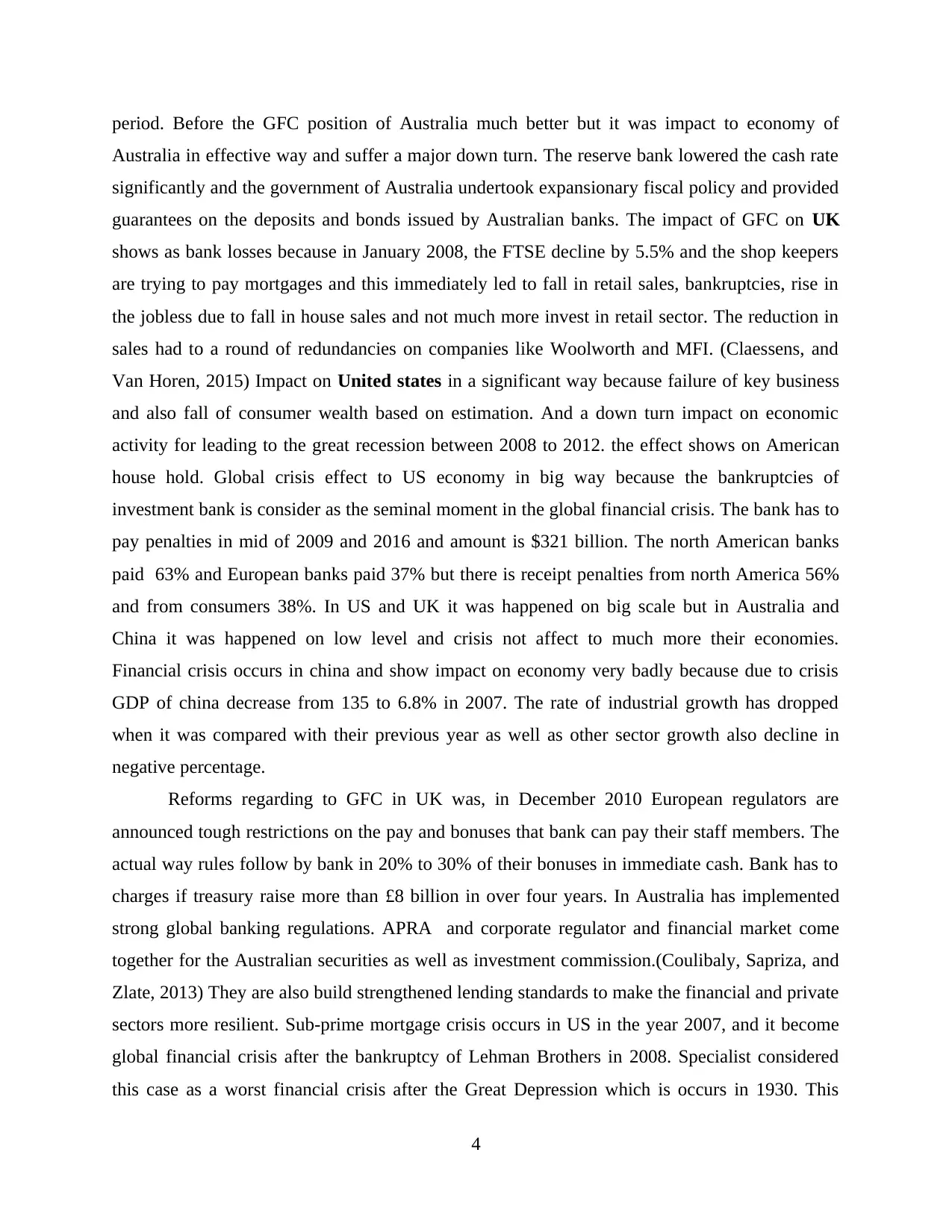
period. Before the GFC position of Australia much better but it was impact to economy of
Australia in effective way and suffer a major down turn. The reserve bank lowered the cash rate
significantly and the government of Australia undertook expansionary fiscal policy and provided
guarantees on the deposits and bonds issued by Australian banks. The impact of GFC on UK
shows as bank losses because in January 2008, the FTSE decline by 5.5% and the shop keepers
are trying to pay mortgages and this immediately led to fall in retail sales, bankruptcies, rise in
the jobless due to fall in house sales and not much more invest in retail sector. The reduction in
sales had to a round of redundancies on companies like Woolworth and MFI. (Claessens, and
Van Horen, 2015) Impact on United states in a significant way because failure of key business
and also fall of consumer wealth based on estimation. And a down turn impact on economic
activity for leading to the great recession between 2008 to 2012. the effect shows on American
house hold. Global crisis effect to US economy in big way because the bankruptcies of
investment bank is consider as the seminal moment in the global financial crisis. The bank has to
pay penalties in mid of 2009 and 2016 and amount is $321 billion. The north American banks
paid 63% and European banks paid 37% but there is receipt penalties from north America 56%
and from consumers 38%. In US and UK it was happened on big scale but in Australia and
China it was happened on low level and crisis not affect to much more their economies.
Financial crisis occurs in china and show impact on economy very badly because due to crisis
GDP of china decrease from 135 to 6.8% in 2007. The rate of industrial growth has dropped
when it was compared with their previous year as well as other sector growth also decline in
negative percentage.
Reforms regarding to GFC in UK was, in December 2010 European regulators are
announced tough restrictions on the pay and bonuses that bank can pay their staff members. The
actual way rules follow by bank in 20% to 30% of their bonuses in immediate cash. Bank has to
charges if treasury raise more than £8 billion in over four years. In Australia has implemented
strong global banking regulations. APRA and corporate regulator and financial market come
together for the Australian securities as well as investment commission.(Coulibaly, Sapriza, and
Zlate, 2013) They are also build strengthened lending standards to make the financial and private
sectors more resilient. Sub-prime mortgage crisis occurs in US in the year 2007, and it become
global financial crisis after the bankruptcy of Lehman Brothers in 2008. Specialist considered
this case as a worst financial crisis after the Great Depression which is occurs in 1930. This
4
Australia in effective way and suffer a major down turn. The reserve bank lowered the cash rate
significantly and the government of Australia undertook expansionary fiscal policy and provided
guarantees on the deposits and bonds issued by Australian banks. The impact of GFC on UK
shows as bank losses because in January 2008, the FTSE decline by 5.5% and the shop keepers
are trying to pay mortgages and this immediately led to fall in retail sales, bankruptcies, rise in
the jobless due to fall in house sales and not much more invest in retail sector. The reduction in
sales had to a round of redundancies on companies like Woolworth and MFI. (Claessens, and
Van Horen, 2015) Impact on United states in a significant way because failure of key business
and also fall of consumer wealth based on estimation. And a down turn impact on economic
activity for leading to the great recession between 2008 to 2012. the effect shows on American
house hold. Global crisis effect to US economy in big way because the bankruptcies of
investment bank is consider as the seminal moment in the global financial crisis. The bank has to
pay penalties in mid of 2009 and 2016 and amount is $321 billion. The north American banks
paid 63% and European banks paid 37% but there is receipt penalties from north America 56%
and from consumers 38%. In US and UK it was happened on big scale but in Australia and
China it was happened on low level and crisis not affect to much more their economies.
Financial crisis occurs in china and show impact on economy very badly because due to crisis
GDP of china decrease from 135 to 6.8% in 2007. The rate of industrial growth has dropped
when it was compared with their previous year as well as other sector growth also decline in
negative percentage.
Reforms regarding to GFC in UK was, in December 2010 European regulators are
announced tough restrictions on the pay and bonuses that bank can pay their staff members. The
actual way rules follow by bank in 20% to 30% of their bonuses in immediate cash. Bank has to
charges if treasury raise more than £8 billion in over four years. In Australia has implemented
strong global banking regulations. APRA and corporate regulator and financial market come
together for the Australian securities as well as investment commission.(Coulibaly, Sapriza, and
Zlate, 2013) They are also build strengthened lending standards to make the financial and private
sectors more resilient. Sub-prime mortgage crisis occurs in US in the year 2007, and it become
global financial crisis after the bankruptcy of Lehman Brothers in 2008. Specialist considered
this case as a worst financial crisis after the Great Depression which is occurs in 1930. This
4
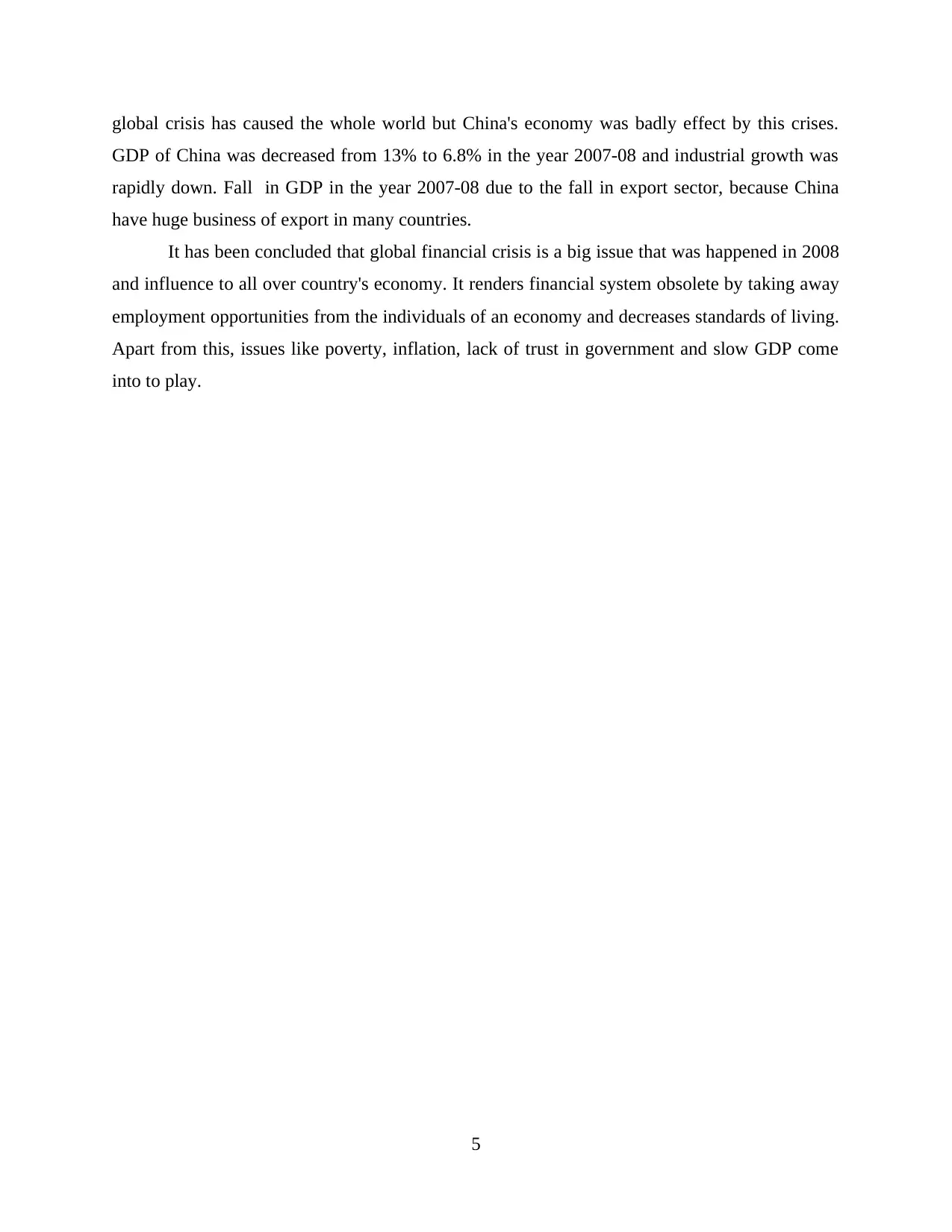
global crisis has caused the whole world but China's economy was badly effect by this crises.
GDP of China was decreased from 13% to 6.8% in the year 2007-08 and industrial growth was
rapidly down. Fall in GDP in the year 2007-08 due to the fall in export sector, because China
have huge business of export in many countries.
It has been concluded that global financial crisis is a big issue that was happened in 2008
and influence to all over country's economy. It renders financial system obsolete by taking away
employment opportunities from the individuals of an economy and decreases standards of living.
Apart from this, issues like poverty, inflation, lack of trust in government and slow GDP come
into to play.
5
GDP of China was decreased from 13% to 6.8% in the year 2007-08 and industrial growth was
rapidly down. Fall in GDP in the year 2007-08 due to the fall in export sector, because China
have huge business of export in many countries.
It has been concluded that global financial crisis is a big issue that was happened in 2008
and influence to all over country's economy. It renders financial system obsolete by taking away
employment opportunities from the individuals of an economy and decreases standards of living.
Apart from this, issues like poverty, inflation, lack of trust in government and slow GDP come
into to play.
5
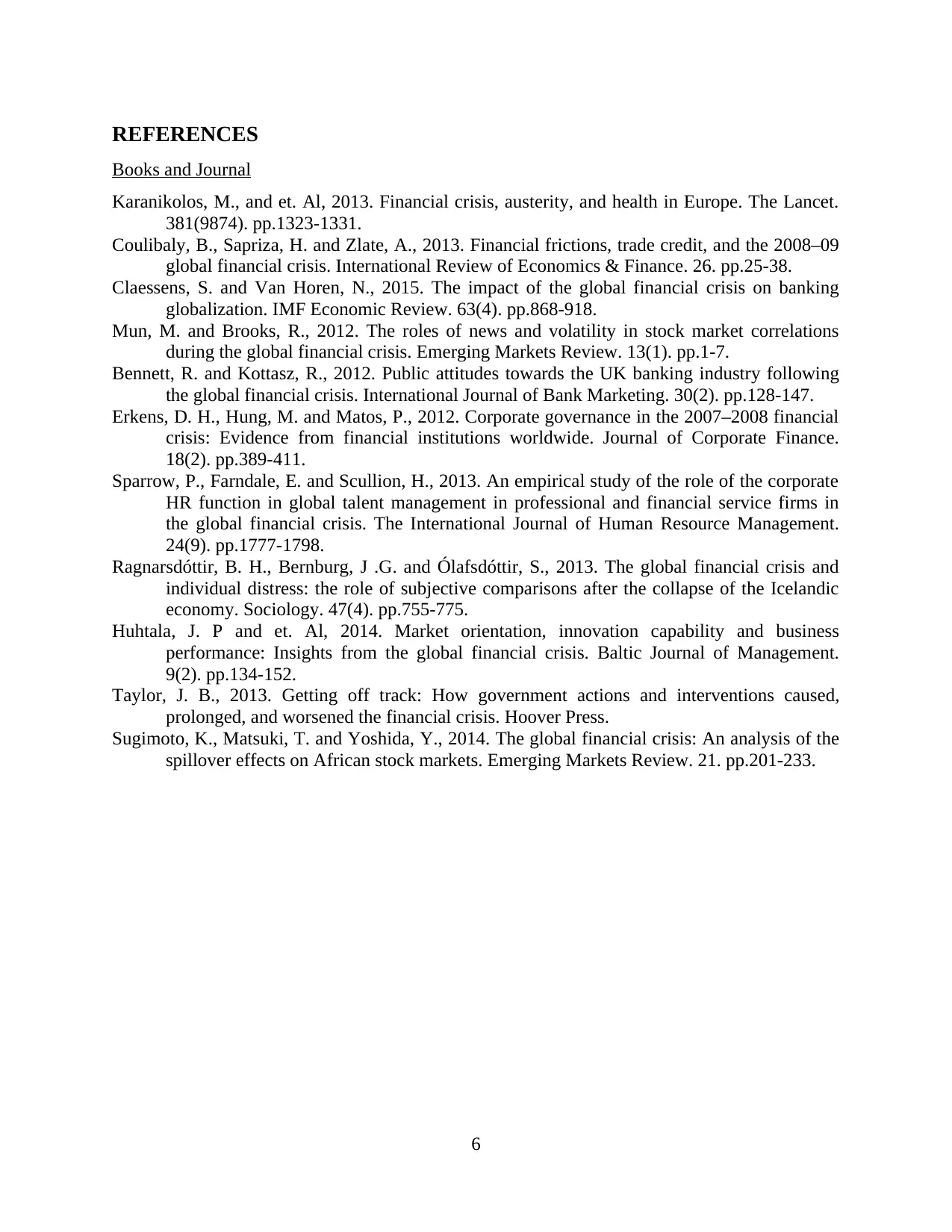
REFERENCES
Books and Journal
Karanikolos, M., and et. Al, 2013. Financial crisis, austerity, and health in Europe. The Lancet.
381(9874). pp.1323-1331.
Coulibaly, B., Sapriza, H. and Zlate, A., 2013. Financial frictions, trade credit, and the 2008–09
global financial crisis. International Review of Economics & Finance. 26. pp.25-38.
Claessens, S. and Van Horen, N., 2015. The impact of the global financial crisis on banking
globalization. IMF Economic Review. 63(4). pp.868-918.
Mun, M. and Brooks, R., 2012. The roles of news and volatility in stock market correlations
during the global financial crisis. Emerging Markets Review. 13(1). pp.1-7.
Bennett, R. and Kottasz, R., 2012. Public attitudes towards the UK banking industry following
the global financial crisis. International Journal of Bank Marketing. 30(2). pp.128-147.
Erkens, D. H., Hung, M. and Matos, P., 2012. Corporate governance in the 2007–2008 financial
crisis: Evidence from financial institutions worldwide. Journal of Corporate Finance.
18(2). pp.389-411.
Sparrow, P., Farndale, E. and Scullion, H., 2013. An empirical study of the role of the corporate
HR function in global talent management in professional and financial service firms in
the global financial crisis. The International Journal of Human Resource Management.
24(9). pp.1777-1798.
Ragnarsdóttir, B. H., Bernburg, J .G. and Ólafsdóttir, S., 2013. The global financial crisis and
individual distress: the role of subjective comparisons after the collapse of the Icelandic
economy. Sociology. 47(4). pp.755-775.
Huhtala, J. P and et. Al, 2014. Market orientation, innovation capability and business
performance: Insights from the global financial crisis. Baltic Journal of Management.
9(2). pp.134-152.
Taylor, J. B., 2013. Getting off track: How government actions and interventions caused,
prolonged, and worsened the financial crisis. Hoover Press.
Sugimoto, K., Matsuki, T. and Yoshida, Y., 2014. The global financial crisis: An analysis of the
spillover effects on African stock markets. Emerging Markets Review. 21. pp.201-233.
6
Books and Journal
Karanikolos, M., and et. Al, 2013. Financial crisis, austerity, and health in Europe. The Lancet.
381(9874). pp.1323-1331.
Coulibaly, B., Sapriza, H. and Zlate, A., 2013. Financial frictions, trade credit, and the 2008–09
global financial crisis. International Review of Economics & Finance. 26. pp.25-38.
Claessens, S. and Van Horen, N., 2015. The impact of the global financial crisis on banking
globalization. IMF Economic Review. 63(4). pp.868-918.
Mun, M. and Brooks, R., 2012. The roles of news and volatility in stock market correlations
during the global financial crisis. Emerging Markets Review. 13(1). pp.1-7.
Bennett, R. and Kottasz, R., 2012. Public attitudes towards the UK banking industry following
the global financial crisis. International Journal of Bank Marketing. 30(2). pp.128-147.
Erkens, D. H., Hung, M. and Matos, P., 2012. Corporate governance in the 2007–2008 financial
crisis: Evidence from financial institutions worldwide. Journal of Corporate Finance.
18(2). pp.389-411.
Sparrow, P., Farndale, E. and Scullion, H., 2013. An empirical study of the role of the corporate
HR function in global talent management in professional and financial service firms in
the global financial crisis. The International Journal of Human Resource Management.
24(9). pp.1777-1798.
Ragnarsdóttir, B. H., Bernburg, J .G. and Ólafsdóttir, S., 2013. The global financial crisis and
individual distress: the role of subjective comparisons after the collapse of the Icelandic
economy. Sociology. 47(4). pp.755-775.
Huhtala, J. P and et. Al, 2014. Market orientation, innovation capability and business
performance: Insights from the global financial crisis. Baltic Journal of Management.
9(2). pp.134-152.
Taylor, J. B., 2013. Getting off track: How government actions and interventions caused,
prolonged, and worsened the financial crisis. Hoover Press.
Sugimoto, K., Matsuki, T. and Yoshida, Y., 2014. The global financial crisis: An analysis of the
spillover effects on African stock markets. Emerging Markets Review. 21. pp.201-233.
6
1 out of 7
Related Documents
Your All-in-One AI-Powered Toolkit for Academic Success.
+13062052269
info@desklib.com
Available 24*7 on WhatsApp / Email
![[object Object]](/_next/static/media/star-bottom.7253800d.svg)
Unlock your academic potential
© 2024 | Zucol Services PVT LTD | All rights reserved.





